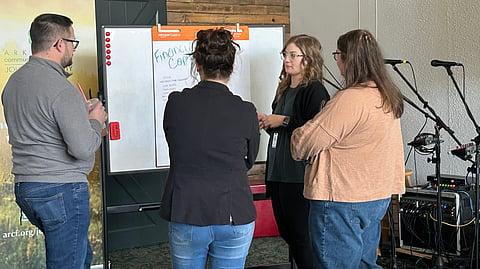
- Home
- Topic Areas
- Newsletter
- Podcast
- 100 Families Initiative
- About
- Connect
- Restore Hope

The 100 Families Alliance Meeting of Johnson and Franklin Counties brought together community members, leaders, and organizations for an interactive and solutions-driven conversation about strengthening food systems and ensuring access to nutritious food for all families. The 100 Families Initiative aims to help families transition from crisis to thriving using local resources.
Lauren Morris of the Community Foundation was a guest facilitator at the meeting. She guided the group in discussing food security, differentiating it from food insecurity. Rather than focusing solely on feeding people in crisis, the goal is to build resilient food systems that prevent families from experiencing food shortages in the first place. The discussion revolved around five core aspects of food security.
Physical barriers present a significant challenge, as many families struggle with food deserts, where grocery stores are miles away and reliable transportation options are scarce. In fact, 83% of Johnson County is considered a food desert, making access to food a daily struggle for many residents.
Nutrition is another key concern, as access to fresh, healthy food is limited. Rising costs of lean proteins, fresh produce, and dairy products further complicate families’ ability to maintain a balanced diet. The issue of affordability adds to the problem, with 58% of Johnson County residents falling into the ALICE category (Asset Limited, Income Constrained, Employed). These individuals earn too much to qualify for government assistance but still struggle to cover their basic needs, including food. Food safety is also essential, as proper storage and preparation knowledge play a crucial role in maximizing food longevity and maintaining health.
Lastly, a client-centered approach to food assistance is necessary, ensuring that support is tailored to individuals’ specific needs. This includes considerations such as cultural food preferences, access to cooking facilities, and dietary restrictions, all of which impact a person’s ability to utilize available food resources effectively.
To create a sustainable impact, attendees participated in a collaborative brainstorming session, identifying Johnson and Franklin County’s resources and how they could be leveraged to improve food security. Various forms of community capital were mapped out, including:
Human Capital: Experts in food systems, educators, and local advocates.
Social Capital: Networks of organizations working in food access, such as food pantries and churches.
Political Capital: City and county officials who can influence policy changes like zoning laws for community gardens.
Financial Capital: Funding sources, grants, and potential budget allocations for food security initiatives.
Cultural Capital: Community events and education programs that promote healthy eating habits.
Built Capital: Available spaces for food storage, farmers’ markets, and community kitchens.
Natural Capital: Local farms and gardens that could supply fresh food.
Participants worked in small groups to connect these resources and develop actionable strategies to improve food security in Johnson County.
Lauren Morris emphasized, “Johnson County has the ingredients. Now, we need to create the recipe for food security.” Through continued collaboration and commitment, a future where no family goes hungry is within reach.
Attendees were encouraged to sign up for follow-up meetings and join HopeHub, the collaborative case management software used by members of the 100 Families Alliance. HopeHub allows organizations to track families' needs and ensure efficient coordination among service providers.
Smart Justice is a magazine, podcast, and continuing news coverage from the nonprofit Restore Hope and covers the pursuit of better outcomes on justice system-related issues, such as child welfare, incarceration, and juvenile justice. Our coverage is solutions-oriented, focusing on the innovative ways in which communities are solving issues and the lessons that have been learned as a result of successes and challenges.
The podcast is available on all major podcasting platforms.
Subscribe to the Smart Justice newsletter.
